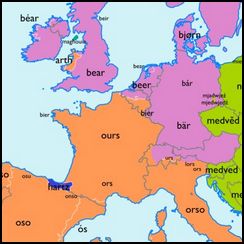Google Languages

Who never used Google Maps or Street View raise his/her hand! OK, maybe someone is there, but there is no doubt that both applications are valuable projects, whose usefulness has changed the way in which we use to think the web. There are many projects of this kind in Internet now. Some have been more successful than others but everyone has helped transforming the network into a point of reference for many disciplines. Many of these projects got the contribution of thousands if not millions of users, such as Wikipedia or the lesser-known GalaxyZoo or PlanetHunters. All of them demonstrated that collecting the contributions of many people it is possible to create a unique value in the network in terms of knowledge.
Among the many existing disciplines, there is one that has always fascinated me, linguistics, and in particular etymology, that is, the study of the origin of words. I also had an interest in comparative linguistics, especially during the research carried out during the writing of some novels of mine, because I find intriguing how neighboring countries may use sometimes similar, sometimes totally different terms for certain concepts, indicating how those languages evolved and also spread as the result of specific historical events.
I recently found these European maps that show how some objects, plants, or animals are called in various countries of Europe and the Mediterranean. I think that these maps are very interesting and that they would be even more useful if we had an even greater detail, that is, if we also mapped the various regional languages, both national (such as the Sardinian) and supranational (such as Occitan), dialects, and local idioms and if we extended this scheme to all the terms of all languages of the planet.
Obviously it would be a gargantuan project, but no more than already is, for example, Wikidictionary. The point is that what may be impractical for a single university or research institute, can be accomplished in a few years by taking advantage of the social lever.
Of course, such a project would need a strong sponsor, even because a well-designed platform is necessary in order to let users simply focus on adding content. That’s why I titled this project Google Languages. Obviously I do not know if Google is or not interested in such a project, since I do not have any relationship with that company, but it would be nice if they would start it, since it is a map-oriented project, and Google has great experience in maps.




















Please use Facebook only for brief comments.
For longer comments you should use the text area at the bottom of the page.
Facebook Comments